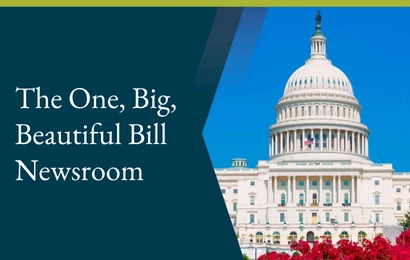What the "No Tax on Tips" Provision Means for Your Restaurant - and What to Do About It
The Basics: What the Law Says
Beginning in tax year 2025, tips “received by an individual in an occupation which customarily and regularly received tips” may exclude up to $25,000 of voluntary tip income from their federal taxable income. While this definition of “qualified tips” may require some clarification, the OBBBA also extends the FICA Tip Tax Credit under IRC 45B(b)(2), which was previously reserved for food and beverage providers, to employees providing services in hair care, nail care, esthetics, and spa treatments. If we point to IRC 45B(b)(2) with respect to food and beverage operators, this separately stated but relevant list refers to “tips received from customers in connection with the providing, delivering, or serving of food or beverages for consumption if the tipping of employees delivering or serving food or beverages by customers is customary.” Whether or not certain employees like a line cook, who customarily hadn’t participated in a tip pool can now participate in a tip pool to claim qualified tips will require additional guidance.
The deduction is only applicable to the employee’s federal income tax, and not applicable to their Social Security, Medicare, unemployment, or state and local taxes. This benefit begins to phase out at $150,000 of modified adjusted gross income for single filers and $300,000 for joint filers. The provision is currently set to expire after 2028. Importantly, only tips that are truly voluntary and left at the discretion of the customer qualify for this exclusion. The law explicitly excludes mandatory service charges or automatic gratuities from this definition.
Why It Matters to Restaurant Owners
In response to state and local legislative initiatives, some establishments in recent years have moved away from traditional tipping, opting instead for service charges to promote wage equity and reduce reliance on inconsistent tip income. While well-intentioned, these models now place employees at a tax disadvantage: tips that come via a service charge or automatic percentage do not qualify for the tax break.
This has already sparked concern across the industry. Operators fear this change may create a two-tier workforce — one where tipped front-of-house staff benefit from tax-free income, while back-of-house or non-tipped roles are left behind.
Organizational Issues You Might Face
- Morale & Retention Challenges: Staff in roles not eligible for the deduction (e.g., kitchen, hosts, salaried managers) may feel disadvantaged compared to servers who receive deductible tip income.
- Compensation Inequity: Moving away from service charges may reintroduce old wage disparities between front and back of house.
- Payroll & Compliance Complexity: Distinguishing between voluntary tips and mandatory charges is now more important than ever. Improper reporting could result in audit risk or missed tax savings for your team. Coupled with OBBBA’s “No Tax on Overtime” provision which makes processing payroll even more complex.
What You Can Do
- Reassess Your Model: If feasible, quantify the value to your employees if moving away from an automatic gratuity or service charge model so that they can participate in the tax savings. They may have valuable input in making this decision.
- Clarify Reporting Practices: Work with your payroll provider to ensure voluntary tips are clearly separated from service charges on W-2s. This is key to preserving eligibility for the deduction.
- Establish Tip Sharing Plans: Create compliant tip pooling structures that allow eligible employees to share in voluntary tips while keeping distributions within the IRS's rules.
- Communicate Early and Often: Keep staff informed about what the new law means and how your pay structure aligns with it. Confusion or misinformation could erode trust.
How Citrin Cooperman Can Help
The “No Tax on Tips” provision may benefit many workers, but it could also exacerbate pay inequities for restaurants that have opted out of traditional tipping. To stay competitive and retain talent, operators should carefully consider whether to adjust compensation models or build new systems that ensure fairness and compliance in the new tax landscape.
Citrin Cooperman’s Restaurants and Hospitality Industry Practice is skilled in helping clients assess options to drive growth and achieve their strategic goals. For more information, please contact Bob Gilbert or info@citrincooperman.com.
Explore the Latest OBBBA Updates

Latest Article Cards

Citrin Cooperman Expands Workiva Solutions Practice with 13 New Members
Read More

How Financial Services Companies Outsource to Stay Competitive
Read More

Cybersecurity Threats: Important Considerations for the Future of Business — A Conversation with Kevin Ricci
Read More

What the One, Big, Beautiful Bill Means for Not-for-Profit Organizations
Read More


